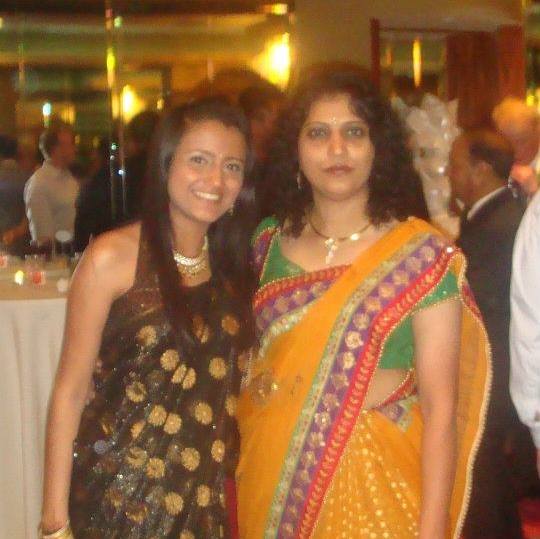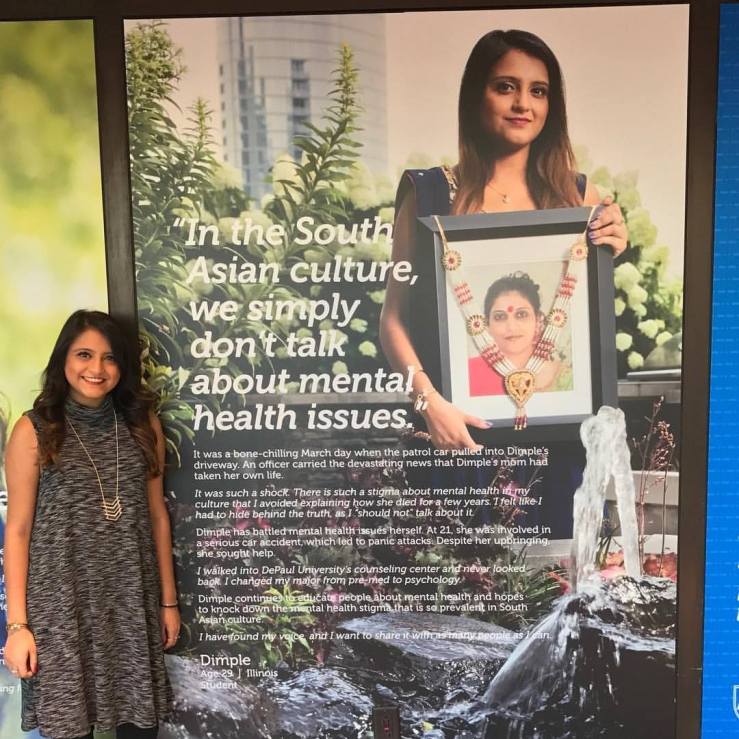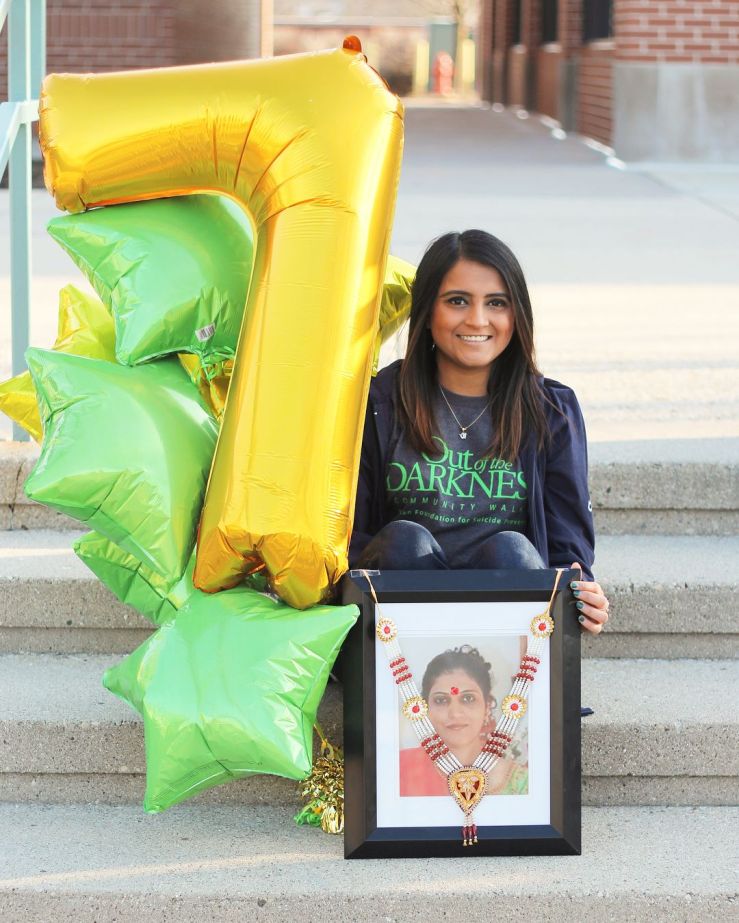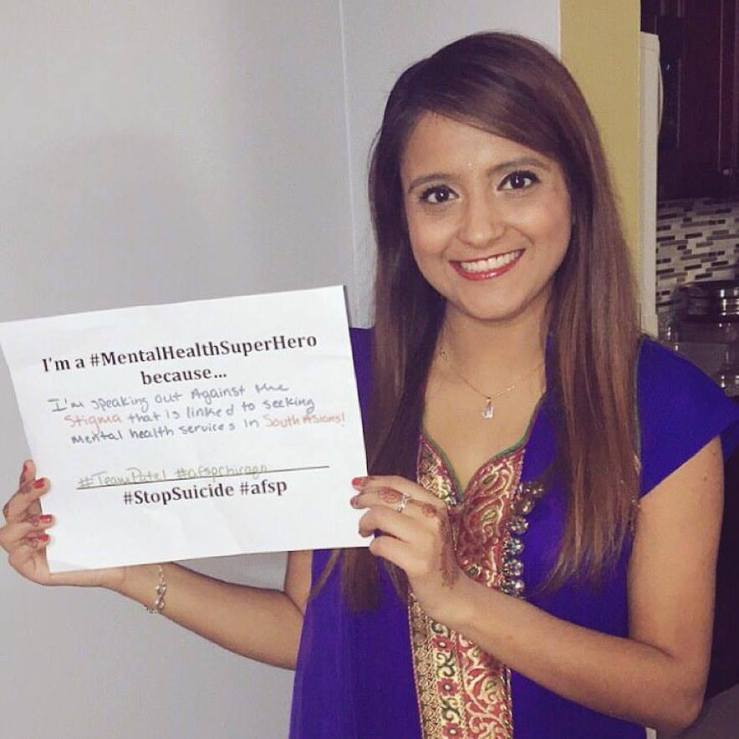 Dimple Patel from West Chicago, Illinois, remembers the day she received an alarming number of missed calls at work eight years ago.
Dimple Patel from West Chicago, Illinois, remembers the day she received an alarming number of missed calls at work eight years ago.
Earlier that day, Dimple went to the library to study for the GRE before heading to work later that evening. Her mom had called a few hours earlier, asking if she could pick up some medications from Walgreens.
“I knew she was having a difficult time, but I didn’t know it was that bad. She never once verbalized suicidal ideations,” said the 31-year-old therapist.
When Dimple called a few family members back, they told her to leave work and immediately head home.
“I was talking to a friend on my drive back, I kept saying, ‘I think something is wrong,’ but tried not to think about it as much.”
The drive back home took 40 minutes. Dimple had a bad feeling in the pit of her stomach but tried to convince herself to stay calm.
“In a matter of hours, my life flipped upside down—as if someone sucker punched me and ripped my heart out,” said Dimple.
Dimple said she was the last person in the family to find out that her mom had taken her life. It was a police officer who had told her the news that her mom died by suicide.
“All I wanted to do was cry. I just could not provide an explanation of what happened…you always hear about these stories, but when it happens to you, what do you do?”
After her mom had passed, Dimple was devastated by some of the misconceptions and hurtful rumors in the South Asian community about her mom’s passing. These myths and hurtful assumptions prompted her to shatter the stigma of mental health through her advocacy and doctoral work later in her career.
“It just helped me realize how much ignorance is still out there. I truly saw the lack of education about mental health issues,” said Dimple, a doctoral student in clinical psychology. Next year, she will be working as a therapist with a focus on spreading awareness about South Asian mental health, she says.

“My mom’s death also helped me hone in on what I wanted to focus on. It helped me see how big of an issue this was in our community,” said Dimple. “I remember when I had lost all hope of getting into my doctorate program. It was my mom that kept encouraging me to keep trying.”
In the South Asian community, mental health is stigmatized and not openly discussed or talked about because of the shame attached to seeking services, Dimple explained.
“After my mom’s passing, I debated if I should share my mom’s story and my experience with it. As I reflect on the past today, I am glad I did. Unknowingly, I found what I was meant to do.”
According to the National Institute of Mental Health, approximately one in five U.S. adults (44.7 million) lives with a mental illness. And according to the American Foundation for Suicide Prevention, suicide is the tenth leading cause of death in the U.S. Additionally, Asian-Americans are three times less likely to seek mental health services or support.
Dimple remembers worrying about what others in the South Asian community were going to say because of the stigma and shame attached to mental illness.
“I was worried about what others were going to say. I lost my mother to suicide in 2011. I never publicly said my mother died by suicide. At the time, I actually did not know anyone else who had lost their parent to suicide. I felt so alone even despite having a good support system around me,” said Dimple.

Dimple recalls that it took many years for her to realize that sharing her mom’s story provided an important and much-needed space for other South Asians to not feel alone and to know there are resources and support out there.
Since the passing of her mom, Dimple has emerged as a mental health advocate in the South Asian community, inspired to tell her mother’s story and help others who are struggling with mental illness.
Dimple was recently nominated for consideration to the Board of Directors for the Illinois Chapter of the American Foundation for Suicide Prevention (AFSP).
“To be nominated is such an honor. Over the past few years, AFSP has become a big part of my life and it has given me an outlet to speak openly about suicide prevention without the stigma and shame that is often attached to it,” said Dimple.
Dimple hopes that by sharing her mom’s story, she will work toward shattering the stigma behind mental health in the South Asian community and help make difference in someone’s life as a clinical psychologist.
In 2016, she participated in Deconstructing Stigma, a mental health campaign created by the McLean Hospital. The photo and story installation aim to help deconstruct and share the stories of those who have been affected by mental health illness.
In the campaign, Dimple shared her mom’s story in a piece titled, “In the South Asian Culture, We Simply Don’t Talk about Mental Health.” The story was featured on display at an exhibit at the Boston Logan International Airport alongside hundreds of others.
“It took me a long time to process that my mother’s death was a suicide. There is such a stigma about mental health in my culture. At first, I just did not know how to explain it, or even approach it. I felt like I had to hide behind the truth, as I ‘should not’ talk about it. It made me so angry,” said Dimple.
Earlier this year, Dimple launched a project on Instagram, @MentalHealthBhavanas, named in memory of her mom, Bhavana. The aim of this project is to raise awareness about mental health in the South Asian community and facilitate conversations, reduce the stigma and shame attached to mental illness, and provide education and resources.
Prior to losing her mom at age 23, Dimple shares that she faced her own mental health challenges while in undergrad. But it wasn’t until her mother’s passing when Dimple began to really look at mental health issues within the South Asian culture and realized how mental health continues to be stigmatized and that more awareness and resources need to be made available in the community.
“Even from my own experience in college, as Asian-Americans we are expected to fit into the Model Minority Myth,” said Dimple.
After a car accident in 2008 Dimple fractured her pelvis and experienced depression and anxiety. A few weeks into college, that’s when Dimple experienced her first panic attack. Over the years, and shortly after her mother’s passing, Dimple continued to struggle with mental health issues like depression and anxiety.
“I noticed myself sinking into depression. It felt like waves, up and down, but more down. I didn’t want to eat, I couldn’t sleep, and I hated being alone. I tried not to sleep as much because I would dream about her. I had such vivid dreams that she was still alive and we had to explain where she was and what happened. It was the only time I could actually feel her and I hated waking up because I didn’t want to be in reality.”
Dimple knew she needed help, so she went to a counseling center at DePaul University. It was there when she realized her true calling: serving as a mental health advocate in her community and helping others through their mental health challenges.

“Imagine if we openly were able to talk about mental health issues within the South Asian community? How many lives would we be able to save? How many individuals would seek professional services? Just what if…? We need to keep talking about these uncomfortable topics and bring awareness to them as well as providing psychoeducation,” said Dimple.
Therapy allowed Dimple to rebuild her life and encourage others to seek help as well. Today, she shares that she has been more consistent with therapy. In a blog post with Brown Girl Magazine, Dimple shared her transparency about dealing with generalized anxiety disorder as a therapist.
In 2014, Dimple organized “Team Patel,” a group of mental health advocates for the Chicagoland Out of the Darkness walk through the American Foundation for Suicide Prevention. #TeamPatel, an organized effort to raise awareness for suicide prevention, has raised approximately $11,000 so far to help shed awareness about South Asian mental health and suicide prevention. Dimple is currently planning the fifth year of #TeamPatel through the 2018 Out of the Darkness Chicagoland Community Walk on September 22. She is walking for her mom, Bhavana, and many other mental health advocates and individuals who struggle with mental illness.
Dimple said before this walk, she didn’t share her mother’s story publicly with anyone for fear of the stigma attached to mental health in the South Asian community, she explained. But in organizing the #TeamPatel walks, she’s come to realize how powerful it is to share her mom’s story and help toward shattering the stigma behind mental health.

“I did not share my story with anyone at first because I was afraid of how others would perceive this situation The stigma attached to mental health issues in the South Asian culture may prevent individuals from seeking professional help due to the cultural pressures and barriers against treatment,” said Dimple.
Dimple said there are moments that reveal that the work she and countless others are doing is making a difference. Every time she shares her mom’s story, an individual from the South Asian community will reach out to her and open up about their own mental health challenges, she shared.
She recalls how someone from the South Asian community recently reached out to her and shared how her brother had been drinking a lot and expressed suicidal ideations.
“She connected with me and finally got her family on board and she spoke to her brother and he has agreed to see a therapist. In that moment, I saw something different. I saw how much of a difference it made for someone else to know what I’ve gone through, my mom, and my clinical experience, even just briefly. I’m really happy that it did make a difference for someone else. That’s the main purpose of this,” said Dimple.
“You are not alone. We all go through something. I just happened to put my voice out there. It takes one person to step up and others will follow. I have had so many people reach out to me privately and share their stories. They appreciated knowing they were not alone and someone was talking about it.”
–Written by Monica Luhar @monicaluhar

*“If you are in crisis, please call the National Suicide Prevention Lifeline at 1-800-273-TALK (8255), or contact the Crisis Text Line by texting TALK to 741741.”
*Dimple Patel is raising funds for the Chicagoland “Out of the Darkness Walk” supporting the American Foundation for Suicide Prevention, through her fundraiser, “Team Patel.” Visit the link here for more information or ways to donate.

